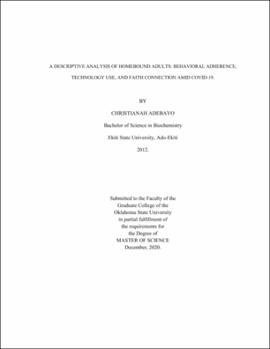| dc.description.abstract | The purpose of the study was to explore homebound older adults' behavior towards technology adoption for connections and faith promotion amid COVID-19. Data of this study was gotten from N= 200, residents within Oklahoma State, USA. Participants were grouped in two, ages 18-49 (n = 96) and ages 50 and above (n = 104). All participants participated in a Qualtrics Survey. Mean age was 49.61; SD = 19.663. Participants reported their likelihood of technology adoption, current technology product use, technology-based faith activities done while homebound, and anticipated health faith behavior in the next year. IBM/SPSS was used to analyze data. On the likelihood of technology adoption, older adults showed a lesser likelihood to give others advice on new technology X 2 (1, N = 188) = 17.842, p < 0.001 nor be able to figure out new high-tech products without help X 2 (1, N = 189) = 16.783, p < 0.001 compared to younger adults. Results of the current technology product use indicated a significant age-based response differences relative to use of social media X 2 (2, N = 177) = 7.113, p < 0.05 and the use of smart/apple watch, X 2 (1, N = 198) = 6.168, p < 0.05 (Table 3). older adults are less likely to respond to the use of social media or devices such as smart/apple watch when compared to younger adults. One significance difference emerged pertaining to the using the internet to download church news bulletins X 2 (1, N = 51) = 11.599, p < 0.001. Therefore, older adults responded that they used the internet to download and view their local church news bulletins compared to those under age 50. Considering the COVID-19 and anticipated technology use over the next 12 months, no significance difference emerged relative to age-based responses. However, a significance difference emerged on the adherence to COVID-19 CDC oriented guidelines. older adults showed greater willingness to use protective masks while attending religious services X 2 (4, N =190) = 24.45, p < 0.001 and also a greater expectation to social distance when attending church activities X 2 (4, N = 189) = 10.618, p < 0.05. Findings from this study have implications relative to informing pastoral ministers, family caregivers and others who interact with older adults on the most applicable technology tools to enhance older adults' ministry and care-giving. This study could be vital to reduce loneliness and improve the quality of life of older adults in situations of social isolation. | |
